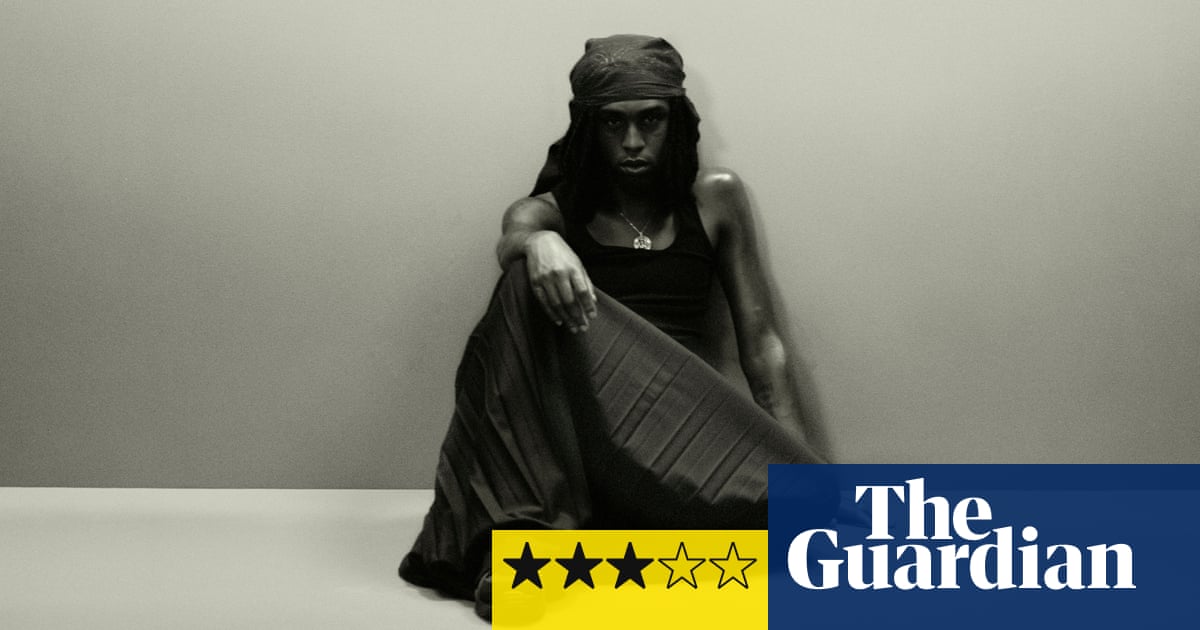
When the up-and-coming north London singer Bakar broke through in 2019, it was with a charming retro love song, Hell N Back. Breezy, brass-laden but sprinkled with enough drug references to maintain a respectable edge, Hell N Back channelled the vintage multicultural London sass of a young Lily Allen; its horns and overindulgence spoke of a love for Amy Winehouse. Bakar’s was a distinctive London voice making an uncommon splash in the US (200m-plus streams), earning props, mentoring and even some catwalk action from the late Virgil Abloh, among other early adopters.
The son of a Tanzanian mother who relocated to Camden, Abubakar Baker Shariff-Farr had other strings to his bow, too. In 2017, his debut single was a snaggle-toothed indie rock cut called Big Dreams, which sounded like Gorillaz in the raw, all punky delivery and melodic bounce – more of a Blur tune, in fact (both bands involve Damon Albarn).
On Nobody’s Home, Bakar’s debut album proper, there are nods both to Blur’s Parklife and Amy Winehouse’s song Tears Dry on Their Own, as well as Keane’s Somewhere Only We Know; Camden, where both Blur and Winehouse propped up bars, is a constant backdrop, as is its leafier neighbour up the hill, Hampstead, NW3, where the 28-year-old Bakar now lives. Growing up with hip-hop in one ear and skinny-trousered indie rock in the other, between grime and electronics, punk and pop, Bakar nonchalantly uses “white stripes up his nose/ Seven Nation Army” as a drug metaphor on a tune called Noun. He’s even got lyrical time for Will & Grace.
On the sophisticated final track, Build Me a Way, Bakar wishes for ‘a way home’ – spiritually more than geographically
But there are also traumatised story-songs such as Change of Heart, in which Bakar leaves names noticeably blank with the omertà of a drill rapper (“it was me and ___/ Back when he was free”) and songs where gospel backing vocals break bread with words about Bakar’s Islamic faith. One of the very best songs here, The Mission, finds Bakar and the track’s producer, SebastiAn, attempting to bend twinkly Tame Impala keyboard rock into something like R&B. Its plea for racial justice has a wry tinge to it. “All I ever hear is people talkin’ about how bad nepotism is. Do you know how badly I want some nepotism in my life?” Bakar seethes in the outro.
There has been much talk over the years of a post-genre world, which is really a world in which musical heritage, skin colour, limiting orthodoxies and personal preferences are all definitively decoupled, one where the rapper Dave can play acoustic guitar at the Brits ceremony (as he did recently) and no one bats an eyelid. It is this future, in which there are no lanes to stray out of, which Bakar embraces, somewhat unevenly, but with aplomb, a more tuneful north London analogue to south London’s genre-masher-in-chief, King Krule.
Throughout Nobody’s Home, love remains a strong suit for Bakar. The sweet-natured NW3 imagines him shacking up with his chosen one – via the alliteration and cadences of hip-hop. “In NW, I might end up with you,” he croons. “Think I found the north-west one, the best one.”
But much of this record’s short and sharp 14-track, 48-minute duration is given over to various kinds of guitar-borne anomie – London stories, Bakar stories. The anger rings particularly true. Ginger Pubes is a hollered, phlegmy, heart-on-sleeve punk tune. “I keep fucking it up, I do,” he yells.
Bakar’s angst is an etiolated thing, divided up between every-guy situations – sometimes accompanied by common-or-garden music – and the more intriguing complexities of his own story. He hasn’t seen his dad in 15 years, he confides on Youthenasia; he’s more angry about it than his mother is. The title of this debut throws down a gauntlet: who belongs where, and why?
This is, ultimately, an album that has a spectacularly strong sense of place – London, NW1 and NW3 – and some very definitive British musical reference points, which nonetheless wonders, eloquently, where home is. Bakar mulls his immigrant experience (the bruised whispers of Not From Here) and, on the album’s sophisticated final track, Build Me a Way, he wishes for “a way home” – spiritually more than geographically.
But even as he advocates for riots and freedom (Riot, Free), Bakar does so while presenting as someone entirely at home in their own skin, one whose musical tastes might not match other people’s assumptions. That’s a problem for other people, not him.








